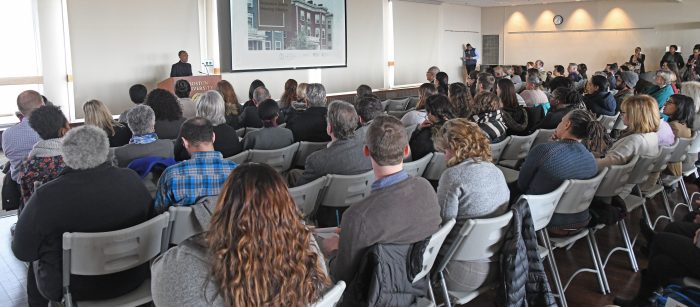Campus Celebrates the Legacy of MLK with Thea James, MD
 Dr. James speaking at MLK celebration.
Dr. James speaking at MLK celebration.
Hiebert Lounge was filled with Medical Campus community members celebrating the legacy of Dr. Martin Luther King, Jr. on Thursday, Jan. 23. This year the annual event was hosted by BUSM Associate Dean for Diversity & Inclusion John I. Polk, MD, and featured guest speaker Thea James, MD, Associate Professor of Emergency Medicine and BMC’s Vice President of Mission and Associate Chief Medical Officer.
Dr. Polk welcomed attendees and briefly reflected on the life and legacy of Dr. King. He shared his favorite Dr. King quote, “Injustice anywhere is a threat to justice everywhere. We are caught in an inescapable network of mutuality, tied in a single garment of destiny. Whatever affects one directly, affects all indirectly.”
BU’s Associate Chaplain for Episcopal Ministry Rev. Dr. Karen Coleman opened the event with an invocation, “Heavenly God of all creation, in your divine providence and wisdom, you have called us your people, to be living witnesses to your truth, love and justice in the world … You give us the grace and strength to be instruments of your mercy and compassions in the world that is often filled with hatred, bigotry and indifference.”
The invocation was followed by a performance by the BUMC student dance troupe Kulture.
Former BUSM Associate dean of Diversity & Inclusion Dr. Rafael Ortega then introduced Dr. James. “It is a great honor to welcome guest speaker Thea James. Thea’s passion for public health both domestically and internationally is simply extraordinary.” He added that her experiences and accomplishments were too many to summarize. “Let me end by saying that because of her expertise Thea has been deployed after 9/11 to New York City, to New Orleans after Hurricane Katrina, to Iran after the 2003 earthquake and to Haiti after the earthquake of 2010.”
Greeted with warm applause, Dr. James said, “It’s indeed a privilege to share this time with you today to honor the legacy of the great Dr. King whose impact on our country has been profound.”
She began by discussing her upbringing in the Washington, D.C., area when it was more than 70 percent African American. “I grew up seeing a majority population that was African American and African American’s who were thriving,” adding that her parents never discussed race. “In retrospect I’ve tried to sort of unpack that a little bit and I think it was because they didn’t want me to be entertaining these notions of limitations and glass ceilings and things like that.”
Dr. James projected some family photos onto the screen, including one of her great grandmother who grew up during a time of slavery and lived to be 108.
Dr. James’ father served as her mentor. “He would never allow me to judge people,” she said. “If we encountered a cashier in a fast food place who was not exactly rude, but maybe not overly pleasant, and I commented on that while we walked away from the counter, he would stop me right there and say ‘you have no right to say that; you don’t know that person’s story.’”
She shared how her father’s wisdom still affects her work in the ER. “I always felt that I needed the whole story and I also needed to know what it would take for this to never happen again,” said Dr. James adding, “the answer to that question was always in the whole story.”
Elaborating, she discussed how health cannot be prioritized for people making tough decisions about how to manage life with limited resources. “Perpetual cycles of ER visits, hospital admissions, poor health outcomes and high costs persist because these are just downstream consequences of root causes upstream like insecurities in income, educational attainment and housing,” said Dr. James. She noted how discouraging it is to repeatedly treat people “only to discharge them back to what you know is causing it.”
Dr. James explained how this connects to BMC’s mission to decrease costs and improve outcomes by focusing on social determinants of health. “We are working upstream targeting root causes to identify opportunities for economic mobility, self sufficiency and independence, and the ability to thrive for our patients.”
She noted that this task cannot be accomplished by hospitals alone and partnerships are necessary to pool or share resources and assets. She explained that with the creative opportunities comes the mindfulness not to recreate structural barriers, “Many of these systems are old, restrictive, and they create structural barriers to us thriving as a safety net health-care system.”
Dr. James concluded by challenging doctors to ask their patients how they can address what matters most so that they can thrive. “I think that question of ‘what would it take?’ and what would it take for this to never happen again is an invaluable question that we should be asking our patients and asking each other.”
To view photos from the event, visit our Facebook album.
View all posts